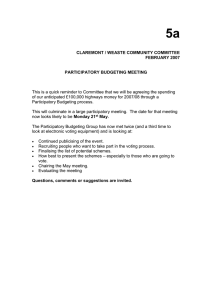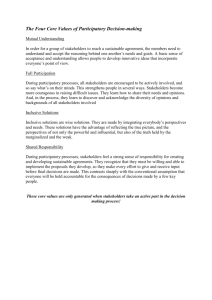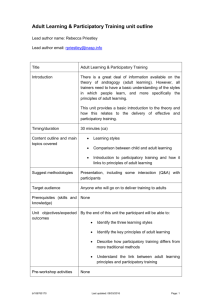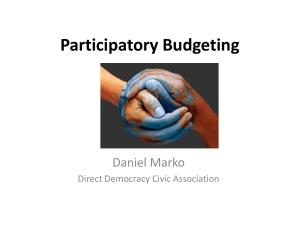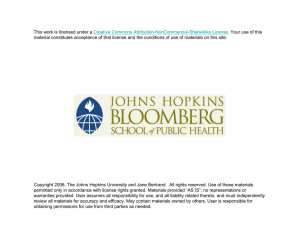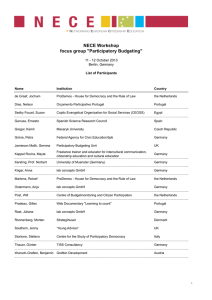NEW YORK UNIVERSITY ROBERT F. WAGNER GRADUATE SCHOOL OF PUBLIC SERVICE
advertisement
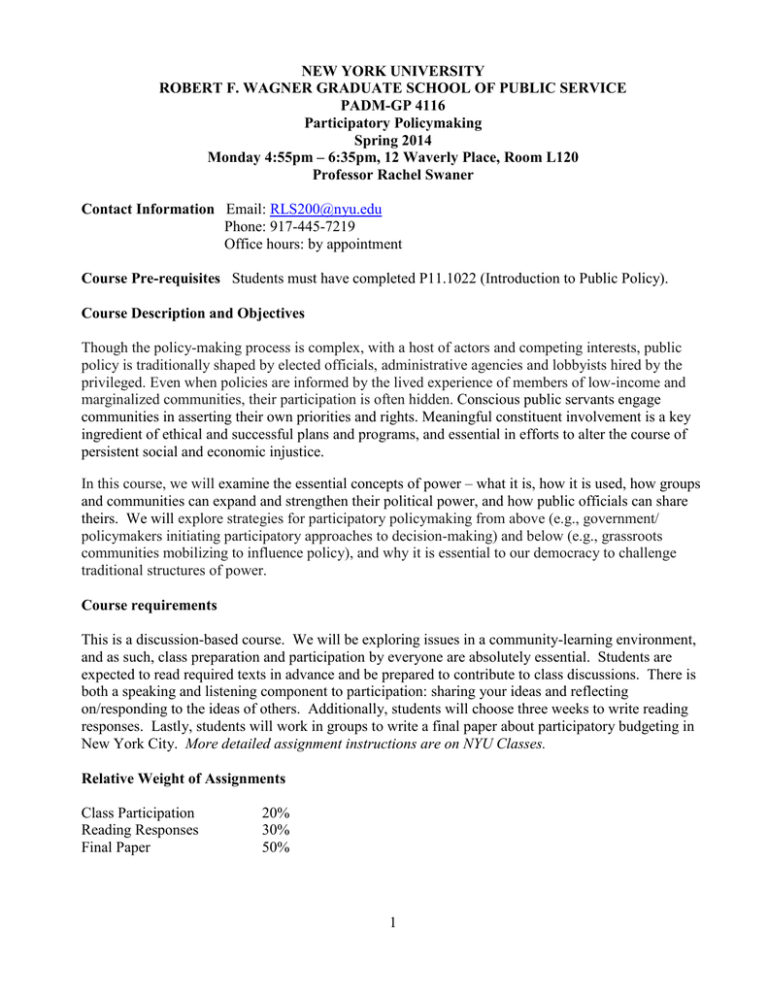
NEW YORK UNIVERSITY ROBERT F. WAGNER GRADUATE SCHOOL OF PUBLIC SERVICE PADM-GP 4116 Participatory Policymaking Spring 2014 Monday 4:55pm – 6:35pm, 12 Waverly Place, Room L120 Professor Rachel Swaner Contact Information Email: RLS200@nyu.edu Phone: 917-445-7219 Office hours: by appointment Course Pre-requisites Students must have completed P11.1022 (Introduction to Public Policy). Course Description and Objectives Though the policy-making process is complex, with a host of actors and competing interests, public policy is traditionally shaped by elected officials, administrative agencies and lobbyists hired by the privileged. Even when policies are informed by the lived experience of members of low-income and marginalized communities, their participation is often hidden. Conscious public servants engage communities in asserting their own priorities and rights. Meaningful constituent involvement is a key ingredient of ethical and successful plans and programs, and essential in efforts to alter the course of persistent social and economic injustice. In this course, we will examine the essential concepts of power – what it is, how it is used, how groups and communities can expand and strengthen their political power, and how public officials can share theirs. We will explore strategies for participatory policymaking from above (e.g., government/ policymakers initiating participatory approaches to decision-making) and below (e.g., grassroots communities mobilizing to influence policy), and why it is essential to our democracy to challenge traditional structures of power. Course requirements This is a discussion-based course. We will be exploring issues in a community-learning environment, and as such, class preparation and participation by everyone are absolutely essential. Students are expected to read required texts in advance and be prepared to contribute to class discussions. There is both a speaking and listening component to participation: sharing your ideas and reflecting on/responding to the ideas of others. Additionally, students will choose three weeks to write reading responses. Lastly, students will work in groups to write a final paper about participatory budgeting in New York City. More detailed assignment instructions are on NYU Classes. Relative Weight of Assignments Class Participation Reading Responses Final Paper 20% 30% 50% 1 Course Schedule and Readings (All readings are available on NYU Classes, except where links are provided below.) Class 1: January 27 – Introduction and Overview; Understanding Power Alinsky, S. 1971. Rules for Radicals: A Practical Primer for Realistic Radicals. New York: Random House. o “The Purpose” o “A Word About Words” Lukes, S. 2005. Power: A Radical View, Second Edition. New York: Palgrave Macmillan. o Chapter 1 (pages 14-59) Hayden, T. 2012. “Participatory Democracy: From Port Huron to Occupy Wall Street.” The Nation, March 27, 2012. Class 2: February 3 – Deliberative Democracy and Citizen Assemblies/Juries Fung, A. 2006. “Varieties of Participation in Complex Governance.” Public Administration Review, Special Issue December 2006:66-75. Fung, A., and Wright, EO. 2003. “Thinking about Empowered Participatory Governance.” In Deepening Democracy, Institutional Innovations in Empowered Participatory Governance. Eds., Fung and Wright. New York: Verso. Pages 3-42. Gastil, J., and Richards, R. 2013. “Making Direct Democracy Deliberative through Random Assemblies.” Politics & Society, 41(2):253-281. Jacobs, LR., Lomax Cook F., and Delli Carpini, MX. 2009. Talking Together: Public Deliberation and Political Participation in America. Chicago: University of Chicago Press. o Chapter 1 (pages 1-23) Fishkin, JS. 2009. When the People Speak: Deliberative Democracy and Public Consultation. New York: Oxford University Press. o “From Athens to Athens” (pages 9-13) Fung, A. 2003. “Deliberative Democracy, Chicago Style: Grass-roots Governance in Policing and Public Education.” In Deepening Democracy, Institutional Innovations in Empowered Participatory Governance. Eds., Fung and Wright. New York: Verso. Pages 111-143. Class 3: February 10 – Participatory Budgeting Lerner, J., and Secondo, D. 2012. “By the People, For the People: Participatory Budgeting from the Bottom Up in North America,” Journal of Public Deliberation, 8(2): Article 2. Marquetti, A., Schonerwald da Silva, CE., and Campbell, A. 2012. “Participatory Economic Democracy in Action: Participatory Budgeting in Porto Alegre, 1989-2004.” Review of Radical Public Economics, 44(1):62-81. Wampler, B. 2012. “Participatory Budgeting: Core Principles and Key Impacts.” Journal of Public Deliberation, 8(2):Article 12. Wampler, B., and Touchton, M. 2014. “Brazil lets its citizens make decisions about city budgets. Here’s what happened.” Washington Post. January 22, 2014. Available at: http://www.washingtonpost.com/blogs/monkey-cage/wp/2014/01/22/brazil-let-its-citizens-makedecisions-about-city-budgets-heres-what-happened/ Taylor, K. 2011. “4 Council Members, Each With $1 Million, Will Let the Public Decide How It’s Spent.” New York Times. September 13, 2011. Available at: 2 http://www.nytimes.com/2011/09/14/nyregion/4-on-ny-city-council-will-let-public-decide-somespending.html Sangha, S. 2012. “Putting in Their Two Cents.” New York Times. March 30, 2012. Available at: http://www.nytimes.com/2012/04/01/nyregion/for-some-new-yorkers-a-grand-experiment-inparticipatory-budgeting.html Guest speakers: Stephen Levin (New York City Council Member) and Lisa Bloodwood (District 33 PB coordinator) Class 4: February 17 – Community Organizing Part 1 Alinsky, S. 1971. Rules for Radicals: A Practical Primer for Realistic Radicals. New York: Random House. o “The Education of an Organizer” o “Communication” Sen, R. 2003. Stir it Up: Lessons in Community Organizing and Advocacy. San Francisco: John Wiley & Sons, Inc. o Introduction: Community Organizing – Yesterday and Today (pages xliii – xlix) Guest speaker: Christopher Kocher (Mayors Against Illegal Guns) Class 5: February 24 – Community Organizing Part 2 Delgado, M., and Staples, L. 2008. Youth-Led Community Organizing. New York: Oxford University Press. o Chapter 9: Youth First in Jackson Square! (pages 175-193) Sen, R. 2003. Stir it Up: Lessons in Community Organizing and Advocacy. San Francisco: John Wiley & Sons, Inc. o Chapter 2: Organizing New Constituencies (pages 24-47) o Chapter 3: Picking the Good Fight (pages 48-78) Class 6: March 3 – Participatory Action Research Right to the City Alliance. 2010. “We Call These Projects Home: Solving the Housing Crisis from the Ground Up.” http://www.cdp-ny.org/report/We_Call_These_Projects_Home.pdf Northridge ME, Shoemaker K, Jean-Louis B, Ortiz B, Swaner R, Vaughan RD, Cushman LF, Hutchinson VE, Nicholas SW. 2005. “What matters to communities? Using community-based participatory research to ask and answer questions regarding the environment and health.” Environmental Health Perspectives, 113 (Suppl. I), 34-41. Fine, M., Ayala, J., and Zaal, M. 2012. “Public Science and Participatory Policy Development: Reclaiming Policy as a Democratic Project.” Journal of Education Policy, 1-8. Ozer, EJ., and Wright, D. 2012. “Beyond School Spirit: The Effects of Youth-Led Participatory Action Research in Two Urban High Schools.” Journal of Research on Adolescence, 22(2):267283. Fisher, C. 2011. “Implications of Participation and Equality in the Research Process for Health Promotion Practice: Domestic Violence as an Example.” Health Promotion Journal of Australia, 22(2):119-123. Guest speakers: Erin Markman and Alexa Kasdan (Urban Justice Center) Class 7: March 10 – Critiques of Participatory Policymaking 3 Risner, G., and Bergan, D. 2012. “The Perils of Participation: The Effect of Participation Messages on Citizens’ Policy Support.” Journal of Public Transportation, 15(2):137-156. Irvin, RA., and Stansbury, J. 2004. “Citizen Participation in Decision Making: Is it Worth the Effort?” Public Administration Review, 64(1):55-65. Hauptmann, E. 2001. “Can Less Be More? Leftist Deliberative Democrats’ Critique of Participatory Democracy.” Polity, XXXIII(3):397-421. 4
